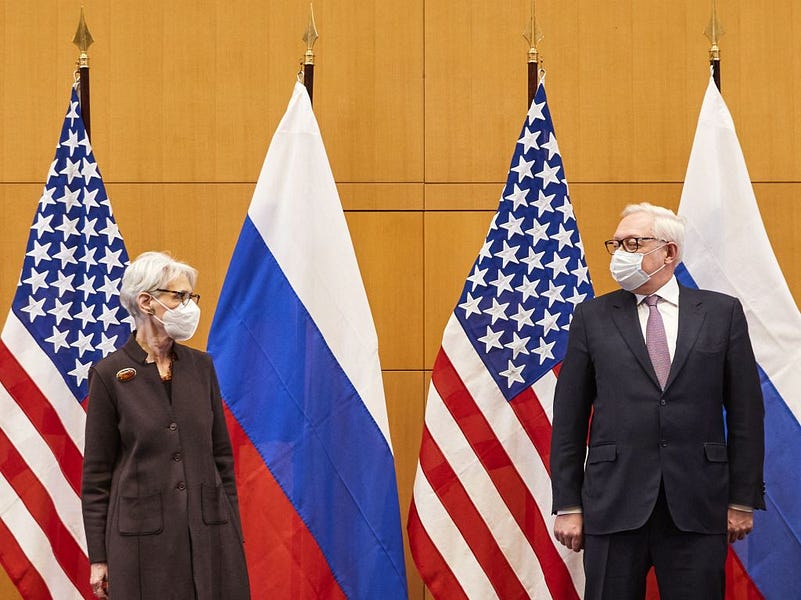On Monday, Russian president-for-life Vladimir Putin explained that the “peacekeeper” paratroopers he sent to Kazakhstan to help quash civil unrest were part of his larger policy of preventing “color revolutions” in former Soviet-bloc countries.
Putin made his remarks at a meeting of the Collective Security Treaty Organization, which the New York Times described as “a body equivalent to NATO that includes six countries from the former Soviet Union.”
I bring this up not to indulge in media criticism but to point out how easy it is to fall for Russian propaganda and the logic of false equivalence when discussing relations with Russia and authoritarian regimes generally. Yes, CSTO is, like NATO, a military alliance, but the similarities end there. Commitment to democratic principles is a membership requirement for NATO. None of CSTO’s members—Russia, Armenia, Belarus, Kazakhstan, Kyrgyzstan and Tajikistan—are democracies. Armenia comes closest; Freedom House designates it a “semi-consolidated authoritarian regime” with a “Democracy Score” of 33 out of 100. The rest are “consolidated authoritarian regimes.”
In short, CSTO is a dictators’ club in which authoritarians agree to protect one another’s grip on power, including from internal threats from their own people. NATO doesn’t send troops into member countries to prop up failed autocrats.
CSTO is also a tool for Putin to rebuild the lost empire of the Soviet Union.
Putin uses another tool toward the same end: military force, or the threat of it. That’s what he’s doing to Ukraine. Putin has deployed about 100,000 troops on the Ukrainian border in preparation for what could be yet another invasion of Russia’s neighbor. The U.S. and Russia are in Geneva this week to figure out a diplomatic exit from the crisis Putin has created.
The mere fact that the U.S. is meeting with Putin to discuss a diplomatic solution is a concession. He loves superpower summits like this because they buttress his government’s propaganda about Russia’s prestige. The fact that Ukraine itself has largely been sidelined in these talks is also a gift to Putin, because it bolsters his claim that a great power like Russia needn’t consult with—never mind recognize the sovereignty of—the little countries it wants to bully.
None of this is to say that the U.S. shouldn’t try to talk Putin out of invading Ukraine. But it does inform what the U.S. should say.
Putin’s case for invading Ukraine is based on his nostalgia for the Soviet Union and Russian imperialism generally. Ukraine once belonged to Russia, and if Russia can’t have it back—still an “if” in Putin’s mind—it should at least be able to dictate Ukraine’s destiny and alliances.
Putin subscribes to the myth—promoted by Russian state propaganda—that America and the West promised not to expand NATO during the negotiations over German reunification and other agreements in the wake of the collapse of the Soviet Union. No such assurances were made, but the United States, the United Kingdom and Russia did agree to the Budapest Memorandum on Security Assurances. In 1994, in exchange for Ukraine voluntarily giving up Soviet nuclear weapons on its soil—then the third-largest arsenal in the world—signatories agreed to defend Ukraine’s territorial integrity and security. Putin declared that agreement null and void when Ukrainians elected a government that wasn’t a vassal to Putin.
Putin’s appetite is bigger than just Ukraine. According to draft treaties released by Russia, Putin wants a sphere of influence where smaller nations along its “near abroad” would have to defer to Russia’s priorities. They would be barred from ever joining NATO, and countries that joined NATO after 1997 would be barred from hosting or training with NATO troops or military assets.
These demands are almost surely a nonstarter, and rightly so. Giving into them would undermine NATO, reward military blackmail and leave our Eastern European allies vulnerable to a regime that has already established it is willing to invade neighbors for its own aggrandizement—most recently in the 2014 military seizure of Crimea from Ukraine.
But Putin is a master of asking for the whole store so he can settle for a shopping cart full of free goodies. And it sounds like the White House is considering concessions, including delaying military assistance to Ukraine.
The political temptation to appease Putin—just a little—is understandable. The last thing Biden needs is yet another international crisis, never mind a war. But one thing is certain: Any concessions to Putin will be little more than down payments on more down the road.







Please note that we at The Dispatch hold ourselves, our work, and our commenters to a higher standard than other places on the internet. We welcome comments that foster genuine debate or discussion—including comments critical of us or our work—but responses that include ad hominem attacks on fellow Dispatch members or are intended to stoke fear and anger may be moderated.
With your membership, you only have the ability to comment on The Morning Dispatch articles. Consider upgrading to join the conversation everywhere.